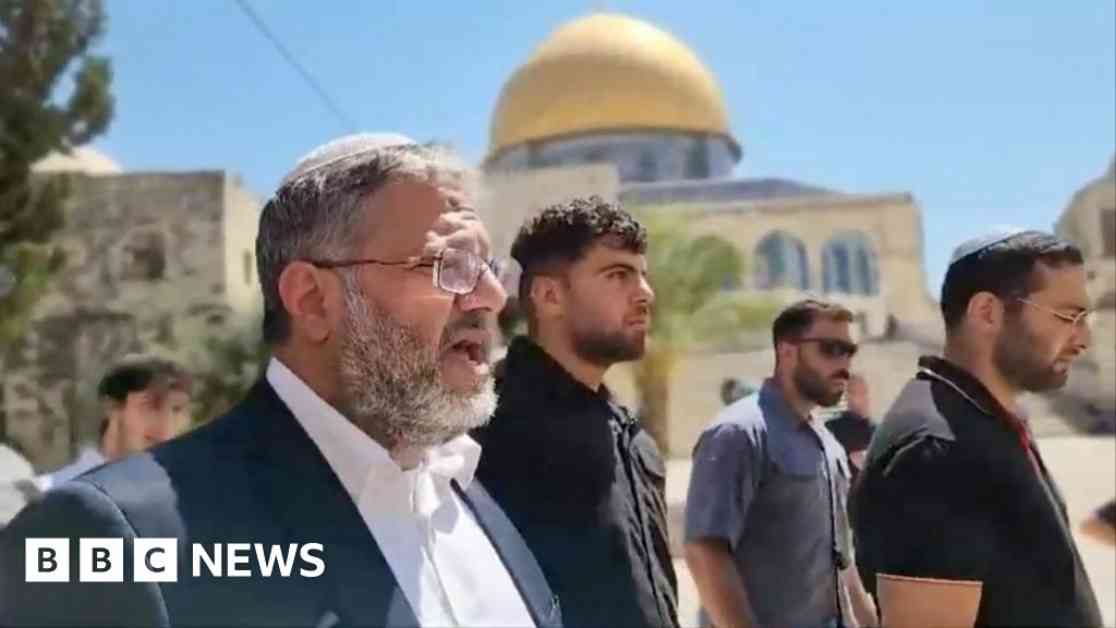Controversy Over Israeli Minister’s Prayer Call at Jerusalem Holy Site
A recent visit by National Security Minister Itamar Ben-Gvir to Jerusalem’s most contested holy site, the al-Aqsa Mosque compound, also known as Temple Mount, has sparked controversy and condemnation from various parties. The site holds significant religious and historical importance for both Jews and Muslims, leading to tensions and disagreements over its governance and access.
Provocative Visit by Israeli Minister
Ben-Gvir’s visit to the al-Aqsa Mosque compound, accompanied by hundreds of Jewish Israelis, defied the Israeli government’s long-standing ban on Jewish prayer at the site. This move was seen as provocative by Palestinian leaders, as well as several countries and international organizations, including the US, France, the UN, and various Arab states. The visit reignited debates over the status quo agreement that governs access and worship at the holy site.
In a video statement, Ben-Gvir expressed his intention to enable Jewish prayer at the site, citing it as a part of their policy. However, the Israeli prime minister’s office clarified that there had been no change to the existing status quo agreement, which allows only Muslim worship at the al-Aqsa Mosque compound. The site’s significance lies in its history as the location of two Biblical temples for Jews and as the place where the Prophet Muhammad ascended to heaven for Muslims.
Historical Context and Current Challenges
Situated in occupied East Jerusalem, the al-Aqsa Mosque compound was captured by Israel from Jordan during the 1967 Middle East war. Under the status quo agreement, Jordan retains its role as the custodian of the site, while Israel is responsible for security and access. However, Palestinians have accused Israel of undermining these arrangements, especially regarding Jewish visitors praying at the site without interference from Israeli authorities.
Recent videos shared on social media depicted groups of Jewish Israelis singing the Israeli national anthem, carrying flags, and praying at the edge of the holy site. Ben-Gvir’s assertion of Israel’s sovereignty over the area and his call for enabling Jewish prayer further fueled tensions and criticisms from various quarters. The incident has raised concerns about the potential for escalating conflicts and the implications for broader regional stability.
International Reactions and Condemnations
The visit by Ben-Gvir and the subsequent events at the al-Aqsa Mosque compound have garnered strong reactions from the international community. Countries like the US, France, Egypt, Saudi Arabia, and others have condemned the actions as provocative and violative of international laws and agreements. The US Secretary of State, Antony Blinken, criticized the visit for disregarding the historic status quo at the holy sites in Jerusalem and exacerbating tensions during ongoing diplomatic efforts for a Gaza ceasefire and hostage release.
The French foreign ministry also condemned the visit as unacceptable, while UN spokesperson Farhan Haq described the incident as unhelpful and unduly provocative. The Jordanian Islamic endowment, responsible for administering the site, appealed to Muslims worldwide to support efforts to maintain the status quo and prevent further escalations at the holy site. Jordan’s foreign ministry echoed these concerns, emphasizing Israel’s obligations as the occupying power and the need to respect international laws and agreements.
Implications and Future Challenges
The controversy surrounding Ben-Gvir’s visit to the al-Aqsa Mosque compound highlights the complex dynamics and sensitivities surrounding the holy site. The longstanding disputes over governance, access, and worship at the site continue to pose challenges for peace and stability in the region. The incident has underscored the need for dialogue, restraint, and adherence to existing agreements to prevent further escalations and promote mutual respect and understanding among all parties involved.
As the international community closely monitors developments at the al-Aqsa Mosque compound, efforts to uphold the status quo agreement and facilitate peaceful coexistence remain crucial. Addressing the root causes of tensions and grievances related to the site requires a comprehensive approach that respects the religious beliefs and practices of all parties while ensuring the preservation of the site’s historical and cultural significance for future generations.
In conclusion, the controversy over Ben-Gvir’s prayer call at the al-Aqsa Mosque compound serves as a reminder of the complexities and challenges inherent in managing religious sites with deep historical and spiritual significance. As stakeholders navigate these sensitive issues, the importance of dialogue, respect for international agreements, and a commitment to peaceful coexistence cannot be overstated. Only through mutual understanding and cooperation can the holy site in Jerusalem serve as a symbol of unity and shared heritage for all who hold it sacred.




















